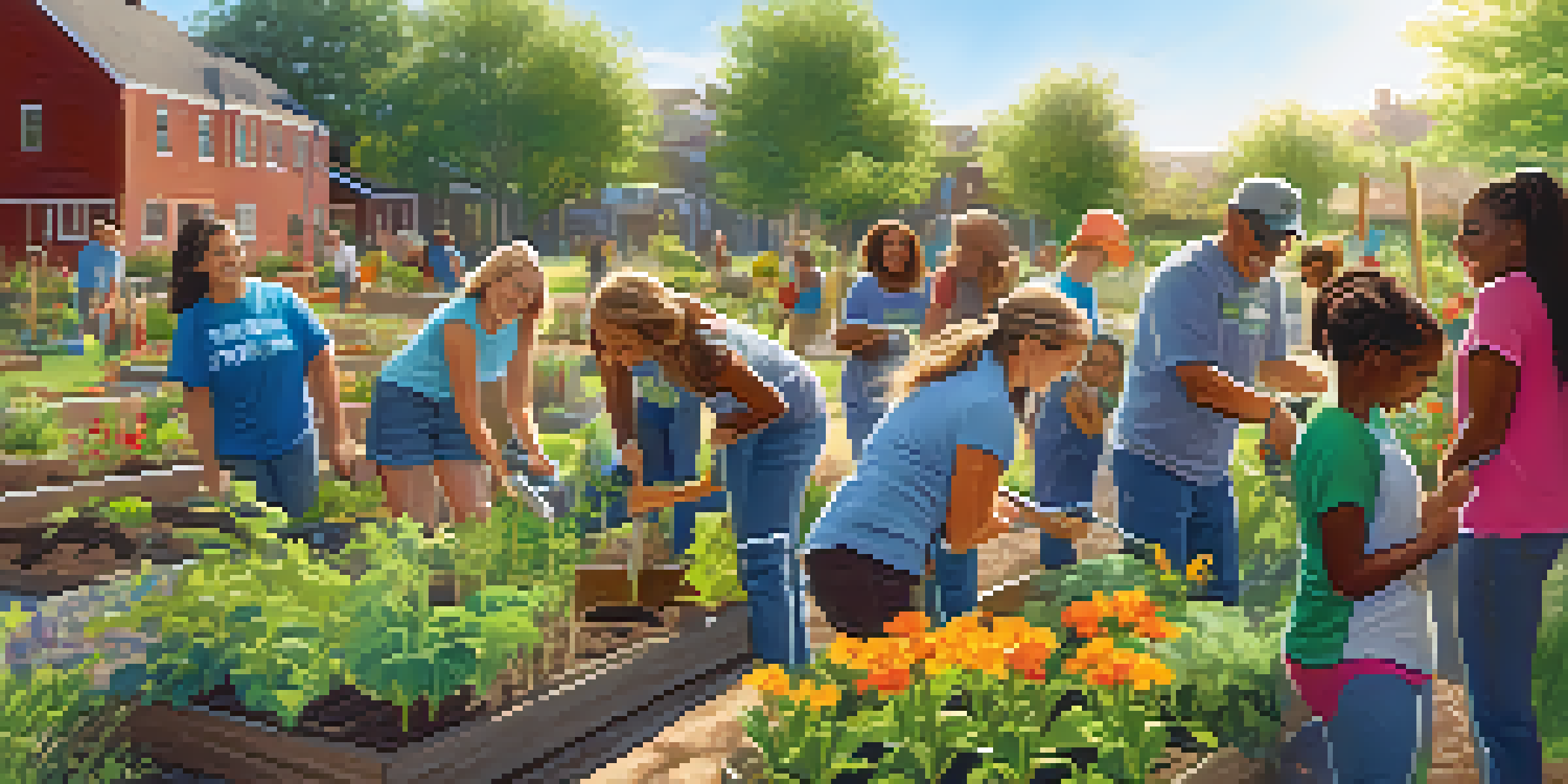Enhancing Soft Skills Through Volunteer Work Opportunities

Understanding Soft Skills and Their Importance
Soft skills are the interpersonal abilities that dictate how we interact with others. They include communication, teamwork, problem-solving, and emotional intelligence. Unlike hard skills, which are job-specific technical abilities, soft skills are crucial across all professions, helping to foster collaboration and improve workplace dynamics.
Soft skills are the interpersonal skills that can boost your career, regardless of the industry you're in.
Employers today increasingly prioritize soft skills in their hiring processes. They recognize that a candidate's ability to communicate effectively and work well with others can significantly impact team productivity and overall company culture. In fact, studies have shown that soft skills can be just as important, if not more so, than technical expertise.
Enhancing your soft skills can lead to better job performance and career advancement. By developing these attributes, you can enhance your adaptability, innovation, and leadership potential, making you a more attractive candidate in a competitive job market.
How Volunteering Provides Unique Learning Opportunities
Volunteering allows individuals to step outside their comfort zones and tackle new challenges. When you engage in volunteer work, you're often faced with situations that require quick thinking, effective communication, and teamwork—all of which are essential soft skills. This hands-on experience is invaluable for personal growth.

For example, working with a diverse group of volunteers can expose you to different perspectives and ideas. This not only enhances your ability to collaborate but also sharpens your understanding of empathy and emotional intelligence. These interactions can teach you how to navigate conflicts and appreciate varying viewpoints.
Soft Skills Are Essential for Success
Soft skills like communication and teamwork are crucial for enhancing workplace dynamics and improving job performance.
Moreover, volunteering often involves taking on roles where leadership is required. Whether you're organizing an event or guiding a team, these experiences can help you build confidence and improve your decision-making skills, both of which are vital for enhancing your soft skills.
Building Communication Skills Through Volunteer Work
Effective communication is at the heart of any successful volunteer experience. When volunteering, you're not just sharing your time; you're also sharing ideas, information, and emotions. This constant exchange helps you practice articulating your thoughts clearly and listening actively to others.
Volunteering is not just about giving; it's about learning and growing as a person.
For instance, if you volunteer at a local shelter, you might need to communicate with fellow volunteers, staff, and those you’re helping. Each interaction presents a chance to refine your verbal and non-verbal communication skills, helping you become more adept at conveying your message and understanding others.
Additionally, volunteering environments often encourage open dialogue and feedback. This culture of communication fosters an atmosphere of learning where you can receive constructive criticism, helping you improve your skills in real time.
Teamwork and Collaboration: Lessons from Volunteering
Volunteering is a team sport, and it's one of the best ways to learn how to work effectively with others. Whether you're part of a community cleanup or a fundraising event, collaboration is key to achieving your goals. These experiences teach you how to leverage each team member's strengths for a common purpose.
Working in a team environment also helps you develop conflict resolution skills. Differences in opinion are natural, but how you navigate those discussions can make or break a project. By volunteering, you can practice negotiating and finding compromises in a low-stakes setting.
Volunteering Boosts Personal Growth
Engaging in volunteer work provides unique opportunities to develop essential soft skills through real-world experiences.
Moreover, the friendships and connections you build through volunteer work can lead to a stronger support network. This camaraderie not only makes the work enjoyable but also reinforces the importance of mutual respect and understanding in effective teamwork.
Problem-Solving Skills Gained from Volunteer Experiences
In volunteer roles, you often encounter unexpected challenges that require quick thinking and creativity. These situations can range from logistical issues during an event to addressing the needs of the community you’re serving. Such experiences can significantly enhance your problem-solving skills.
For example, if a planned activity suddenly falls through, figuring out an alternative on the spot can teach you to think critically and adapt. This ability to pivot is a crucial soft skill that is highly valued in any workplace.
Additionally, volunteers are frequently tasked with evaluating the effectiveness of their initiatives. This reflection process encourages you to analyze what worked, what didn’t, and how to improve, further honing your analytical and strategic thinking abilities.
Emotional Intelligence: A Key Soft Skill Gained from Volunteering
Volunteering provides a unique lens through which to develop emotional intelligence (EI). By engaging with individuals from various backgrounds, you're exposed to different emotional states and perspectives. This exposure cultivates your ability to empathize, a core component of EI.
For instance, when you volunteer at a food bank, you may interact with individuals who are facing hardships. Understanding their stories and challenges helps you develop a greater sense of compassion and awareness of social issues, which can enrich your interpersonal skills.
Networking Enhances Career Opportunities
Volunteering allows individuals to build relationships that can lead to mentorship and job prospects in their desired fields.
Moreover, as you work with fellow volunteers, you learn to recognize and manage your own emotions in a team setting. This self-awareness is crucial for building strong relationships and effectively navigating social complexities in any environment.
Networking and Building Relationships Through Volunteer Work
One often-overlooked benefit of volunteering is the opportunity to expand your network. When you volunteer, you meet people from all walks of life, including professionals from various industries. These connections can lead to mentorship opportunities, collaborations, or even job leads down the road.
For example, if you're volunteering for a nonprofit organization, you might cross paths with someone who works in your desired field. Conversations sparked through shared interests can open doors to valuable insights and career guidance that you might not find elsewhere.

Additionally, building relationships through volunteer work fosters a sense of community. These connections can provide emotional support and encouragement, which can be just as important as professional networking in your career journey.
Taking the First Steps to Volunteer and Enhance Skills
If you're inspired to enhance your soft skills through volunteering, the first step is to identify causes that resonate with you. Whether it’s environmental issues, education, or health care, finding a passion project will make your volunteering experience more fulfilling.
Next, research local organizations or online platforms that connect volunteers with opportunities. Many organizations are eager for support and offer a variety of roles that cater to different skill sets and schedules. Don't hesitate to reach out and ask how you can get involved.
Finally, approach your volunteer experience with an open mind and a willingness to learn. Embrace the challenges and lessons that come your way, and remember that every interaction is a chance to develop your soft skills further. Your time spent volunteering can be both personally rewarding and professionally advantageous.